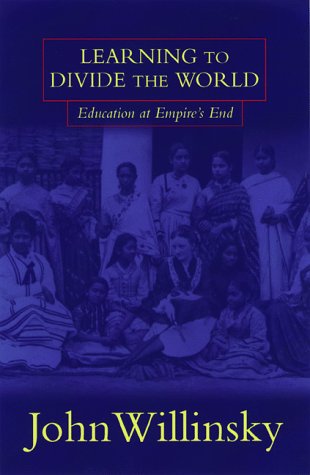"The barbarian rules by force; the cultivated conqueror teaches". This maxim from the age of empire makes explicit the usually hidden connections between education and conquest. In Learning to Divide the World, John Willinsky brings these correlations to light, offering a balanced, humane, and beautifully written account of the ways that imperialism's educational legacy continues to separate us into black and white, east and west, primitive and civilized.Considering a dazzling range of subjects, Willinsky discusses how the discovery of the New World inspired European culture with "the desire to take hold of the world ... to enumerate, order, identify, and differentiate". Willinsky reveals how this "will to know" became a foundation of the apparatus of imperialism, as shown in phenomena ranging from zoos to the British Museum to National Geographic.
Through analyses of colonial schooling, anthropology, and the formation of academic subjects instrumental in the expansion of empire (history, geography, science, language and literature), Willinsky argues that education was and is the research and development arm of imperialism. Drawing on contemporary classrooms and materials, he considers how schools continue to educate the young within the "colonial imaginary". Through primary texts, cutting-edge scholarship and students' voices, Willinsky examines schooling itself, arguing for the incorporation of the imperial legacy into a multicultural education that does not dismiss the achievement of the West but gives an account of the divided world that achievement has created.
Learning to Divide the World raises urgent questions about how colonialism and its attendant ways of learning gaverise to powerful ideas of race, culture, and nation that continue to influence us -- and the children we are responsible for educating.
Examines education's contribution to colonialism and explores how this legacy can be overcome.
"What needs to be made clear is that, as the schools have contributed to racialized identities, so they need to be engaged in study of their own historical construction. This is no more than education's assuming responsibility for its own handiwork, no more than a faith in its ability and need to revise its faulty lessons, and to do so with the young because they may well be the ones who are to suffer those earlier lessons".
- ISBN10 0816630763
- ISBN13 9780816630769
- Publish Date 1 April 1998
- Publish Status Out of Stock
- Out of Print 19 October 2003
- Publish Country US
- Imprint University of Minnesota Press
- Format Hardcover
- Pages 304
- Language English
